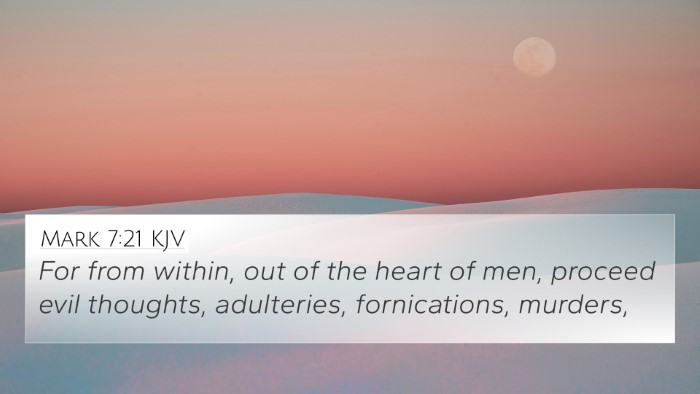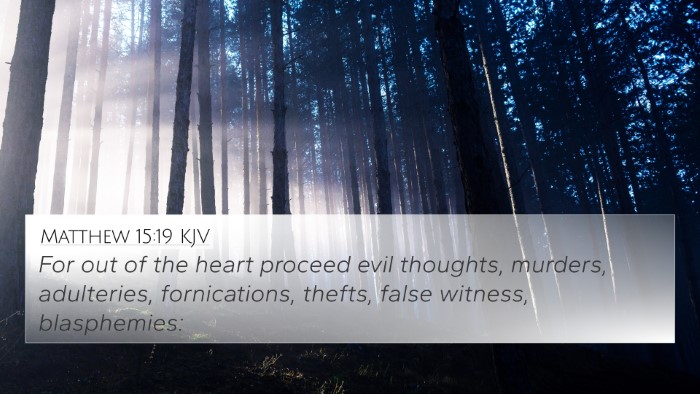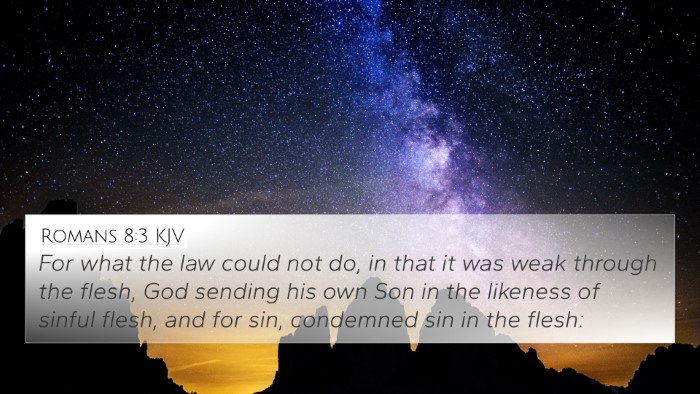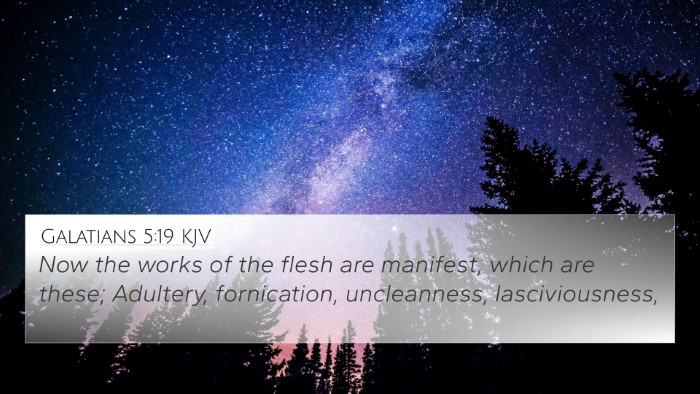Old Testament
Genesis Exodus Leviticus Numbers Deuteronomy Joshua Judges Ruth 1 Samuel 2 Samuel 1 Kings 2 Kings 1 Chronicles 2 Chronicles Ezra Nehemiah Esther Job Psalms Proverbs Ecclesiastes Song of Solomon Isaiah Jeremiah Lamentations Ezekiel Daniel Hosea Joel Amos Obadiah Jonah Micah Nahum Habakkuk Zephaniah Haggai Zechariah MalachiRomans 7:18 Similar Verses
Romans 7:18 Cross References
For I know that in me (that is, in my flesh,) dwelleth no good thing: for to will is present with me; but how to perform that which is good I find not.
Uncover the Rich Themes and Topics of This Bible Verse
Listed below are the Bible themes associated with Romans 7:18. We invite you to explore each theme to gain deeper insights into the Scriptures.
Romans 7:18 Cross Reference Verses
This section features a detailed cross-reference designed to enrich your understanding of the Scriptures. Below, you will find carefully selected verses that echo the themes and teachings related to Romans 7:18 KJV. Click on any image to explore detailed analyses of related Bible verses and uncover deeper theological insights.

John 3:6 (KJV) »
That which is born of the flesh is flesh; and that which is born of the Spirit is spirit.

Romans 7:25 (KJV) »
I thank God through Jesus Christ our Lord. So then with the mind I myself serve the law of God; but with the flesh the law of sin.

Galatians 5:17 (KJV) »
For the flesh lusteth against the Spirit, and the Spirit against the flesh: and these are contrary the one to the other: so that ye cannot do the things that ye would.

Genesis 6:5 (KJV) »
And God saw that the wickedness of man was great in the earth, and that every imagination of the thoughts of his heart was only evil continually.

Job 15:14 (KJV) »
What is man, that he should be clean? and he which is born of a woman, that he should be righteous?

Galatians 5:24 (KJV) »
And they that are Christ's have crucified the flesh with the affections and lusts.

Mark 7:21 (KJV) »
For from within, out of the heart of men, proceed evil thoughts, adulteries, fornications, murders,

Titus 3:3 (KJV) »
For we ourselves also were sometimes foolish, disobedient, deceived, serving divers lusts and pleasures, living in malice and envy, hateful, and hating one another.

Genesis 8:21 (KJV) »
And the LORD smelled a sweet savor; and the LORD said in his heart, I will not again curse the ground any more for man's sake; for the imagination of man's heart is evil from his youth; neither will I again smite any more every thing living, as I have done.

Matthew 15:19 (KJV) »
For out of the heart proceed evil thoughts, murders, adulteries, fornications, thefts, false witness, blasphemies:

Romans 8:3 (KJV) »
For what the law could not do, in that it was weak through the flesh, God sending his own Son in the likeness of sinful flesh, and for sin, condemned sin in the flesh:

Philippians 2:13 (KJV) »
For it is God which worketh in you both to will and to do of his good pleasure.

Romans 7:15 (KJV) »
For that which I do I allow not: for what I would, that do I not; but what I hate, that do I.

Luke 11:13 (KJV) »
If ye then, being evil, know how to give good gifts unto your children: how much more shall your heavenly Father give the Holy Spirit to them that ask him?

Job 25:4 (KJV) »
How then can man be justified with God? or how can he be clean that is born of a woman?

Psalms 119:176 (KJV) »
I have gone astray like a lost sheep; seek thy servant; for I do not forget thy commandments.

Philippians 3:12 (KJV) »
Not as though I had already attained, either were already perfect: but I follow after, if that I may apprehend that for which also I am apprehended of Christ Jesus.

Galatians 5:19 (KJV) »
Now the works of the flesh are manifest, which are these; Adultery, fornication, uncleanness, lasciviousness,
Romans 7:18 Verse Analysis and Similar Verses
Understanding Romans 7:18
Verse: "For I know that nothing good dwells in me, that is, in my flesh. For I have the desire to do what is right, but not the ability to carry it out." (Romans 7:18, ESV)
Context of the Verse
In Romans 7, the Apostle Paul reflects on the struggle between the spirit and the flesh, highlighting an internal conflict faced by believers. This chapter emphasizes human weakness and the desire for righteousness while grappling with the sinful nature.
Summary of Insights
- Matthew Henry's Commentary: Henry explains that Paul recognizes the inherent sinfulness of human nature, affirming that believers hold a sincere desire for righteousness but are often hindered by their fleshly desires. He emphasizes the importance of grace in overcoming this struggle.
- Albert Barnes' Notes: Barnes elaborates on the idea that Paul is speaking from personal experience. He notes that the realization of one's own weaknesses can lead to greater reliance on God's grace and a deeper understanding of the need for spiritual transformation.
- Adam Clarke's Commentary: Clarke points out that the "flesh" refers to the corrupt nature stemming from the Fall. He emphasizes that while desires can be genuine, the actual ability to fulfill those desires is through the power of the Holy Spirit, not through human effort.
Bible Verse Cross-References
Understanding Romans 7:18 becomes clearer when we cross-reference it with other scriptural texts. Here are some related verses:
- Galatians 5:17: "For the desires of the flesh are against the Spirit, and the desires of the Spirit are against the flesh..." - This verse underscores the inner conflict between the spirit and the flesh.
- Romans 8:7-8: "For the mind that is set on the flesh is hostile to God, for it does not submit to God’s law; indeed, it cannot." - This relates directly to the inability to perform good works through human effort alone.
- Philippians 2:13: "For it is God who works in you, both to will and to work for his good pleasure." - This stresses divine help in doing good, aligning with Paul’s struggle in Romans 7:18.
- Jeremiah 17:9: "The heart is deceitful above all things, and desperately sick; who can understand it?" - Paul illustrates the biblical understanding of human depravity.
- 1 John 1:8: "If we say we have no sin, we deceive ourselves, and the truth is not in us." - This verse affirms the reality of sin that Paul grapples with.
- Romans 3:10: "None is righteous, no, not one;" - This brings to light the universal nature of sin that Paul acknowledges in this verse.
- Ephesians 2:3: "Among whom we all once lived in the passions of our flesh…" - This emphasizes the collective human experience of struggling against sin.
- Titus 3:5: "He saved us, not because of works done by us in righteousness, but according to his own mercy..." - This stresses reliance on divine mercy as opposed to human righteousness.
Connecting Themes and Practical Insights
Romans 7:18 encapsulates the theme of human inability to achieve righteousness through sheer will or effort. This theme is explored throughout the New Testament where various authors discuss the necessity of grace and the empowerment of the Holy Spirit.
Thematic Bible Verse Connections
- Struggle with Sin: Paul’s internal conflict echoes other biblical struggles with sin, emphasizing an ongoing theme of redemption and grace.
- God's Mercy: The contrast between human failure and God's mercy is a recurring theme, reflecting the necessity of divine intervention.
- Empowerment Through the Spirit: The call to live by the Spirit, as explored in Galatians, draws a crucial link to Romans 7:18’s message about fleshly limitations.
Tools for Bible Cross-Referencing
To study Romans 7:18 deeply, utilizing tools like a bible concordance or bible cross-reference guide can significantly enhance understanding. These resources allow for:
- Identifying connections between different passages.
- Engaging in cross-reference Bible study methodologies.
- Finding bible references that illuminate related themes.
Conclusion
Romans 7:18 serves as a critical reminder of the human condition and the essential reliance on God's grace and the working of the Holy Spirit for spiritual victory. Through a comparative analysis of related Bible verses, one can glean deeper insights into the themes of sin, grace, and redemption that permeate the scripture.








